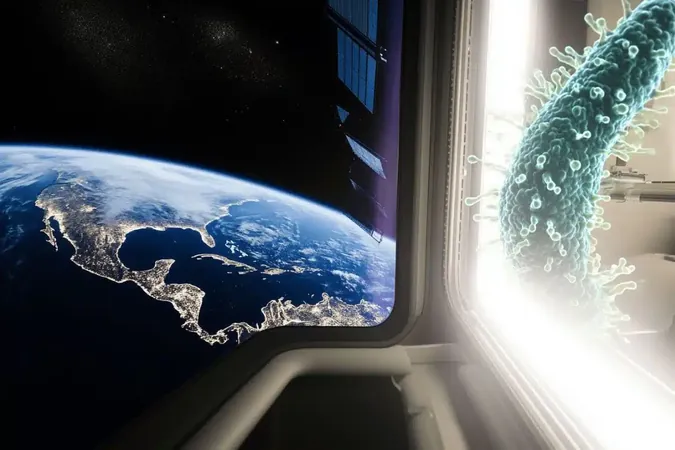
Unveiling a Sci-Fi Surprise: Bacteria from Space Challenge Our Understanding of Life!
2025-07-08
Author: Yan
Space Discovery Straight Out of a Sci-Fi Movie!
In a jaw-dropping turn of events that feels like something straight out of a science fiction film, astronauts aboard China's Tiangong space station have made a groundbreaking discovery that could change our understanding of life beyond Earth. An obscure bacterial species, previously unknown to science, has emerged within the modules of this orbiting laboratory, sending shockwaves through the scientific community and prompting critical questions about the implications for future space exploration.
The Mysterious Microbe: Meet Niallia tiangongensis!
During a routine sampling in May 2023, the Shenzhou-15 crew stumbled upon a remarkable find. They identified a completely new bacterial species, later named Niallia tiangongensis after its celestial birthplace. This discovery marks a monumental leap in space microbiology.
Further analysis through the China Space Station Habitation Area Microbiome Program (CHAMP) revealed that this new microbe shares genetic ties with Niallia circulans, a hardy soil bacterium from Earth. Yet, space’s unforgiving environment has led this newly discovered variant to develop unique adaptations, raising eyebrows among scientists.
Fascinating Adaptations to Space!
What sets Niallia tiangongensis apart is its specialized metabolism. This microorganism shows an impressive ability to break down gelatin to extract vital nitrogen and carbon, while seemingly losing the capacity to utilize other energy sources. Such a significant metabolic shift is a testament to its remarkable evolutionary adaptability in the extreme conditions of space.
The Evolutionary Dance in Space!
This is not the first time microbes have demonstrated an uncanny resilience in extraterrestrial settings. Previously, researchers found microbes sealed in ancient rocks exhibiting similar survival strategies. This suggests that the roots of microbial adaptation extend deep into evolutionary history.
Stressors Aboard the Tiangong!
The unique conditions aboard the space station create intense pressures that drive rapid microbial evolution, including: - Microgravity affecting cellular processes - Elevated radiation levels - Isolated circulating systems with limited microbial diversity - Strict antimicrobial cleaning protocols - Isolation from Earth’s microbial life
Such factors have induced a rapid evolutionary shift in the Tiangong microbiome, markedly different from what is observed on the International Space Station, where human-associated microbes abound.
Microbial Risks: A Double-Edged Sword!
While it remains unconfirmed whether Niallia tiangongensis poses direct health threats to astronauts, its genetic relation to potentially harmful bacteria raises valid concerns. The vulnerable immune systems of astronauts during prolonged missions could heighten the risk of opportunistic infections.
Additionally, uncontrolled microbial growth may endanger mission operations, jeopardizing sensitive equipment due to biofilm formation. As humanity embarks on missions further from Earth—like the recent lunar landing attempts—understanding and managing these microbes becomes crucial.
Lessons for Future Exploration!
The emergence of Niallia tiangongensis is a landmark moment in space microbiology, reminding us how extraterrestrial environments act as natural laboratories for studying microbial evolution. As we set our sights on Martian colonies and beyond, managing space's microbiological dimension will be as pivotal as rocket technology.
Scientists now face the challenge of developing sophisticated monitoring systems and rethinking how we maintain sterile environments, possibly shifting towards managing diverse microbial ecosystems.
A Cosmic Call to Action!
This unexpected bacterial discovery serves both as a cautionary tale and an opportunity. It illustrates that, despite our advanced technology, microorganisms can adapt to the environments we meticulously create, potentially becoming allies or adversaries in our quest to explore the stars.
Understanding and managing the space microbiome could ultimately be as critical to our success in space as any rocket or life support system, ensuring that our journey to the cosmos remains as safe as it is adventurous.


 Brasil (PT)
Brasil (PT)
 Canada (EN)
Canada (EN)
 Chile (ES)
Chile (ES)
 Česko (CS)
Česko (CS)
 대한민국 (KO)
대한민국 (KO)
 España (ES)
España (ES)
 France (FR)
France (FR)
 Hong Kong (EN)
Hong Kong (EN)
 Italia (IT)
Italia (IT)
 日本 (JA)
日本 (JA)
 Magyarország (HU)
Magyarország (HU)
 Norge (NO)
Norge (NO)
 Polska (PL)
Polska (PL)
 Schweiz (DE)
Schweiz (DE)
 Singapore (EN)
Singapore (EN)
 Sverige (SV)
Sverige (SV)
 Suomi (FI)
Suomi (FI)
 Türkiye (TR)
Türkiye (TR)
 الإمارات العربية المتحدة (AR)
الإمارات العربية المتحدة (AR)